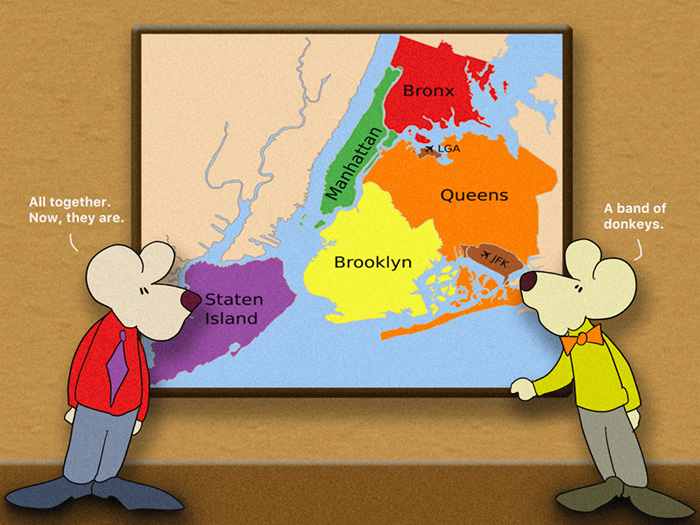Boroughs. Not to be confused with burrows.
As for boroughs. One of the actual definitions from Webster is “each of five divisions of New York City.” In name? The Bronx, Brooklyn, Manhattan, Queens, and Staten Island.
Whenever I hear about the Boroughs of New York, I think of some pack of happy donkeys ambling around the city. But of course, those are burros.
Five of them, part of the bigger whole.
But individually, I think these things:
The Bronx reminds me of bronchitis.
Brooklyn makes me think of bowling when you nail a strike from your opposite pocket.
Manhattan always sounds like the cocktail made with whiskey, sweet vermouth, and bitters.
Queens conjures up all sorts of things, from Elizabeth II, to gay men at a nightclub.
And finally, Staten Island makes me think of ferry boats.
I’m only thinking about this because of Robert Anderson Van Wyck. He was the first mayor of New York City after the consolidation of the five boroughs into the City of Greater New York in 1898. Today is his birthday, July 20, 1849. He was born in NYC.
But, one thing is for certain. Van Wyck was a man of politics and took an active interest in Democratic Party matters. He was elected Judge of the City Court of New York. He later advanced to chief justice. All a part of the ladder upwards, one step at a time, until he became the Democratic Party nomination for Mayor of New York City.
He was elected in 1897 by a huge majority. A landslide victory. He served as mayor of New York City between 1898 and 1901. And as mentioned, he was the first mayor to govern New York City after those five boroughs had been consolidated into a single city.
Merging them together took quite a bit of work on his part. But he adjusted their finances and brought order out of almost total chaos. He also put much time and attention into the construction of the Interborough Rapid Transit.
Yet, even with all of that, Van Wyck is generally regarded as a “colorless mayor.” The leaders of Tammany Hall thought of him as a prop. They figured Robert Anderson Van Wyck would do very little to interfere with the way they wanted to run the city.
But it was the “Ice Trust” scandal of 1900 that did in Van Wick.
Here’s the deal. The American Ice Company of Charles W. Morse planned to double the price of ice. They were cranking it up from 30 to 60 cents per hundred pounds. This was at a time before refrigeration. Doing this would have had horrible effects. Ice was the only preservative available to keep food and medicines fresh. Raising the price would have put ice out of reach of many of the city’s poor. And the poor were Tammany Hall’s main base — poor immigrants.
American Ice decided to cancel the price hike due to the public outcry. Van Wyck’s rivals forced an investigation that showed the American Ice had secured an effective monopoly. But. To top it off? Van Wyck — who only made $15,000 each year as mayor — owned and had not paid for $680,000 worth of American Ice stock. Whoops.
The Ice Trust Scandal destroyed Van Wyck’s political career. Poof. Frozen out. Just like that. He was never implicated, by the way.
I’m sure he did much more in his life, like being married and perhaps having children. But. Now it is time to tell you that he died on November 14, 1918. He was 69.
It reminds me of this. The decisions we make are not without effect. They have consequences, sometimes good, and other times bad. So, as we move through each moment, we must make good choices. For we are a part of the bigger whole.
==========
“What strange phenomena we find in a great city, all we need do is stroll about with our eyes open. Life swarms with innocent monsters.”
― Charles Baudelaire
==========
“You take delight not in a city’s seven or seventy wonders, but in the answer it gives to a question of yours.”
― Italo Calvino, Invisible Cities
==========
“All cities are mad: but the madness is gallant. All cities are beautiful, but the beauty is grim.”
― Christopher Morley
=========
The five became one, the whole.
